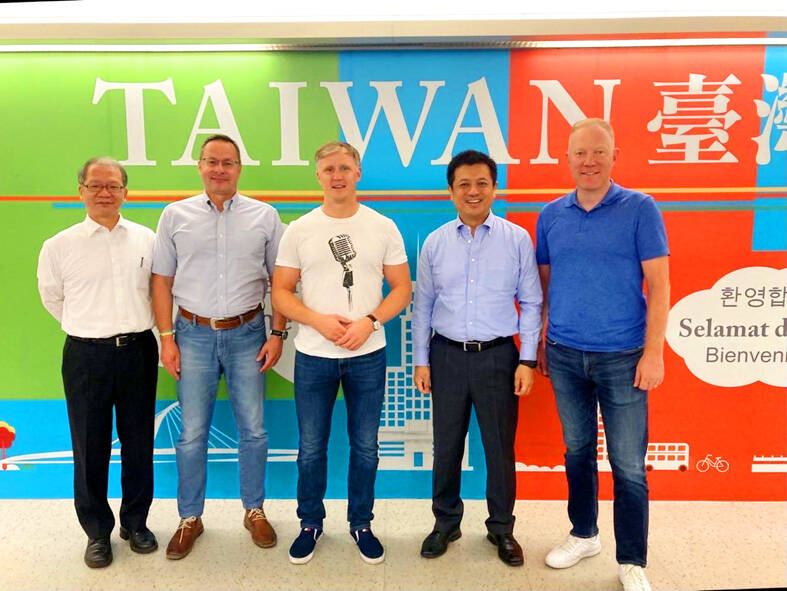The “status quo” of the Taiwan Strait cannot be changed unilaterally, and “any eventual resolution must be found via diplomacy and dialogue,” a delegation comprising the heads of the Estonian, Lithuanian and Latvian parliaments’ foreign affairs committees said yesterday
Marko Mihkelson, chairman of the Foreign Affairs Committee of the Estonian Parliament, Zygimantas Pavilionis, chairman of the Foreign Affairs Committee of the Lithuanian Seimas, and Rihards Kols, chairman of the Foreign Affairs Committee of the Latvian Saeima, arrived in Taiwan yesterday on a six-day visit, the Ministry of Foreign Affairs said.
Pavilionis called them the “Three Baltic Musketeers” in a tweet on X, announcing the start of their visit to the “beacon of freedom, democracy, human rights & rules-based order.”

Photo courtesy of the Ministry of Foreign Affairs
Kols described the trip as a “fact-finding mission/visit” that would focus on security and defense, business, cultural ties and economic partnerships.
“The visit shows a shared policy in relations with Taiwan in accordance with EU policy,” the Estonian Parliament’s Foreign Affairs Committee said in a news release on Saturday.
The three “underline that the status quo in the Taiwan Strait cannot be changed unilaterally, and they oppose the use or threat of force. Any eventual resolution must be found via diplomacy and dialogue,” it said.

Photo: EPA-EFE / Taiwan Presidential Office
In other developments, Lithuanian lawmaker Matas Maldeikis told the Voice of America that Taiwan would ultimately benefit from Lithuania’s success in resisting Chinese economic coercion and political bullying.
“Lithuania was well aware that it would pay a huge price for supporting Taiwan, including commercial losses, but it will not compromise with the [Chinese] Communist Party,” Maldeikis was quoted as saying in a report published in Chinese on Saturday.
“In the long run, the biggest winner from what is happening here [in Europe] is Taiwan,” he said.
In 2021, Taiwan opened the Taiwanese Representative Office in Lithuania in the capital, Vilnius, using the name “Taiwanese” with the permission of Lithuania, instead of “Taipei,” which most countries use for fear of provoking Beijing.
China then imposed economic sanctions on Lithuania, downgraded diplomatic ties between them and withdrew its ambassador from Vilnius, while demanding the European country do the same.
Beijing envisioned a quick win, believing that the Lithuanian government would cave in or make concessions, Maldeikis told the Voice of America.
“The result was unexpected,” he added.
NATO held a summit in Vilnius last month and Lithuania’s exports grew 45 percent in a year and a half after China imposed the sanctions, Maldeikis said.
Lithuania showed other nations that by disobeying China a country can still win, he said.
“We will not sell ourselves out for the Chinese market, nor will we deceive ourselves and others by saying that nothing happened to sell products to the Chinese market,” he said.
Lithuanians standing up to Beijing “forces the EU to stop hiding behind diplomatic, but sometimes meaningless rhetoric when it comes to the situation in the Taiwan Strait,” Una Aleksandra Berzina-Cerenkova, director of Riga Stradins University’s China Studies Centre, said in the Voice of America piece.
The “wolf-warrior diplomacy” practiced by China over the past few years has fueled resentment among Lithuanians, Maldeikis said.
Under the leadership of the US, a new wave of support for Taiwan has emerged in the international community, he said.
In Lithuania, taking a supportive stance toward Taiwan and a firm stance against China helps win votes for politicians, he said.
However, relations between Taiwan and Lithuania sparked controversy last month when Chinese Nationalist Party (KMT) Legislator Wang Hong-wei (王鴻薇) said that Taiwan provided funds and technology to produce 8-inch silicon wafers in Lithuania to cultivate ties.
Representative to Lithuania Eric Huang (黃鈞耀) told the Voice of America that it was a mutually beneficial program with funding provided by both sides.

MAKING WAVES: China’s maritime militia could become a nontraditional threat in war, clogging up shipping lanes to prevent US or Japanese intervention, a report said About 1,900 Chinese ships flying flags of convenience and fishing vessels that participated in China’s military exercises around Taiwan last month and in January have been listed for monitoring, Coast Guard Administration (CGA) Deputy Director-General Hsieh Ching-chin (謝慶欽) said yesterday. Following amendments to the Commercial Port Act (商港法) and the Law of Ships (船舶法) last month, the CGA can designate possible berthing areas or deny ports of call for vessels suspected of loitering around areas where undersea cables can be accessed, Oceans Affairs Council Minister Kuan Bi-ling (管碧玲) said. The list of suspected ships, originally 300, had risen to about 1,900 as

Japan’s strategic alliance with the US would collapse if Tokyo were to turn away from a conflict in Taiwan, Japanese Prime Minister Sanae Takaichi said yesterday, but distanced herself from previous comments that suggested a possible military response in such an event. Takaichi expressed her latest views on a nationally broadcast TV program late on Monday, where an opposition party leader criticized her for igniting tensions with China with the earlier remarks. Ties between Japan and China have sunk to the worst level in years after Takaichi said in November that a hypothetical Chinese attack on Taiwan could bring about a Japanese

MORE RESPONSIBILITY: Draftees would be expected to fight alongside professional soldiers, likely requiring the transformation of some training brigades into combat units The armed forces are to start incorporating new conscripts into combined arms brigades this year to enhance combat readiness, the Executive Yuan’s latest policy report said. The new policy would affect Taiwanese men entering the military for their compulsory service, which was extended to one year under reforms by then-president Tsai Ing-wen (蔡英文) in 2022. The conscripts would be trained to operate machine guns, uncrewed aerial vehicles, anti-tank guided missile launchers and Stinger air defense systems, the report said, adding that the basic training would be lengthened to eight weeks. After basic training, conscripts would be sorted into infantry battalions that would take

DEEP-STRIKE CAPABILITY: The scenario simulated a PLA drill that turned into an assault on Taiwan’s critical infrastructure, with the launchers providing fire support Taiwan yesterday conducted this year’s first military exercises at Longsiang Base in Taichung, demonstrating the newly acquired High Mobility Artillery Rocket System’s (HIMARS) ability to provide fire support and deep-strike capabilities. The scenario simulated an attack on Penghu County, with HIMARS trucks immediately rolling into designated launch areas and firing barrages at the Wangan (望安) and Cimei (七美) islands, simulating the provision of fire support against invading forces. The HIMARS are supposed to “fire and leave,” which would significantly increase personnel and equipment survivability, a military official said. The drill simulated an exercise launched by the Chinese People’s Liberation Army (PLA) Eastern